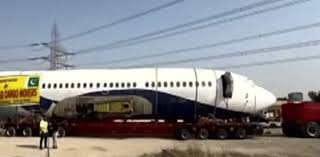Karachi to Hyderabad: Second Plane to Be Transported by Road
The Pakistan Airport Authority (PAA) has taken a proactive step to address the growing need for advanced aviation training by repurposing retired aircraft. This initiative aims to bridge the gap between theoretical learning and practical skills, offering students a chance to work with real aircraft. Karachi to Hyderabad By converting decommissioned planes into training tools, the PAA is setting a benchmark for innovative and resourceful approaches in aviation education. Such efforts are vital for preparing the next generation of aviation professionals and strengthening Pakistan’s position in the global aviation sector.
If you’re looking to start a business or expand your product range, finding high-demand, low-competition products is crucial. This strategy helps you stand out in a crowded market. Discover effective research methods, tools, and actionable steps to identify profitable opportunities. Click here to learn more!
Relocation of Second Decommissioned MD-83 Aircraft:
Karachi to Hyderabad As part of its commitment to improving aviation training, the PAA is relocating a second decommissioned MD-83 aircraft to the Aviation Training Institute in Hyderabad. Weighing a massive 60 tons, this retired aircraft was stationed at Karachi’s Jinnah International Airport. The relocation, scheduled for Monday night, is expected to mark another key milestone in the authority’s efforts to repurpose available resources. This project not only emphasizes the importance of hands-on learning but also highlights the authority’s dedication to creating world-class training opportunities for aviation students.
Advanced Transportation Technology Ensures Safety Karachi to Hyderabad:
Transporting a 60-ton aircraft is no small feat, but the PAA has employed cutting-edge German-engineered trailers to ensure the process is carried out with precision and safety. These trailers are specifically designed to handle the complexities of moving oversized and heavy loads, minimizing risks during the journey. The relocation will take the National Highway and the Gharo-Thatta route, which was carefully chosen for its ability to accommodate such large-scale transportation. Karachi to Hyderabad This advanced technology underscores the authority’s commitment to maintaining the highest safety standards while achieving its ambitious goals.
Successful Precedents and Strategic Planning:
This relocation Karachi to Hyderabad is not the first of its kind. Earlier this year, the PAA successfully transported another decommissioned aircraft to Hyderabad via the Super Highway. This earlier success provided valuable insights into the logistical and operational challenges involved, allowing the current project to benefit from refined strategies. The authority has also secured the necessary No-Objection Certificates (NOCs) to ensure full compliance with legal and regulatory requirements. Project Director Munir Alam has reassured stakeholders that every aspect of the operation has been meticulously planned to ensure a seamless and efficient transfer.
Enhancing Practical Training for Future Aviation Professionals:
One of the primary objectives of this initiative is to enhance the quality of aviation training in Pakistan. By integrating retired aircraft into their curriculum, the Aviation Training Institute in Hyderabad provides students with an unparalleled opportunity to gain practical experience. Karachi to Hyderabad These aircraft serve as valuable tools for teaching key aspects of maintenance, repair, and operation, enabling students to hone their skills in a realistic environment. Such hands-on training is critical for developing the expertise required to meet the demands of the aviation industry, both locally and internationally.
Resourceful and Forward-Thinking Initiatives:
The relocation of decommissioned aircraft exemplifies the PAA’s resourcefulness and innovative thinking. Instead of letting retired planes go to waste, the authority has found a way to turn them into valuable educational assets. This approach not only optimizes resource use but also aligns with global trends of sustainability and innovation. By investing in such projects, the PAA is ensuring that Pakistan’s aviation sector continues to grow and adapt to evolving challenges. These initiatives demonstrate the authority’s foresight and commitment to long-term progress. If you want to know cheap web hosting in Pakistan, Hostinger web-Hosting is one of the Best option.
Conclusion: Shaping the Future of Aviation in Pakistan:
The Pakistan Airport Authority’s efforts to repurpose defunct aircraft represent a bold and visionary approach to advancing aviation training in the country. By focusing on practical education and leveraging innovative solutions, the PAA is laying a strong foundation for the future of the aviation industry. This project is more than just a relocation—it is a statement of intent to equip the next generation of aviation professionals with the skills and experience they need to thrive. With such initiatives, Pakistan is poised to emerge as a hub for cutting-edge aviation training and development.


